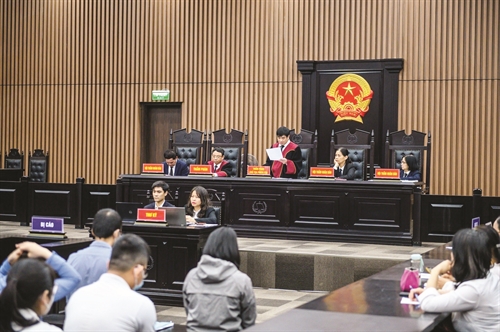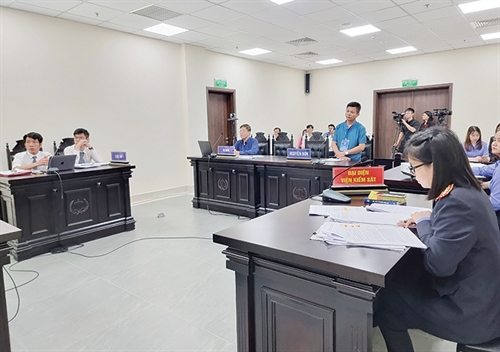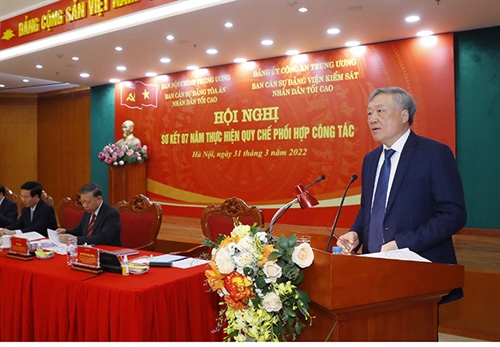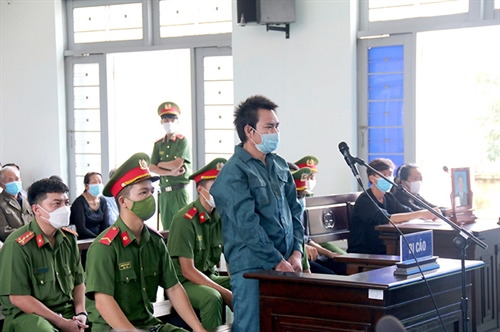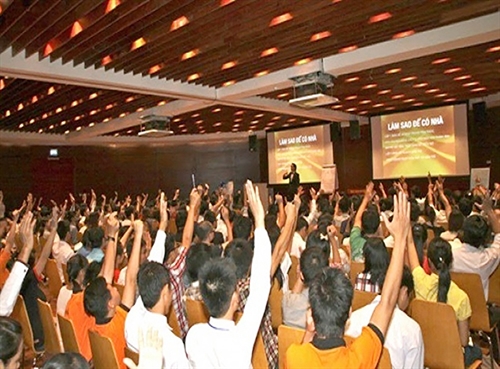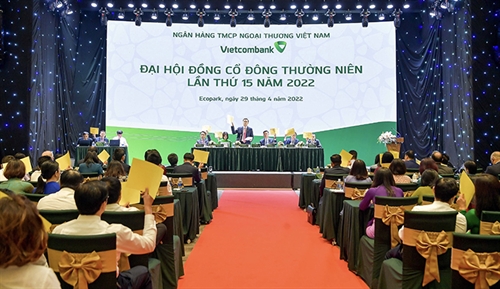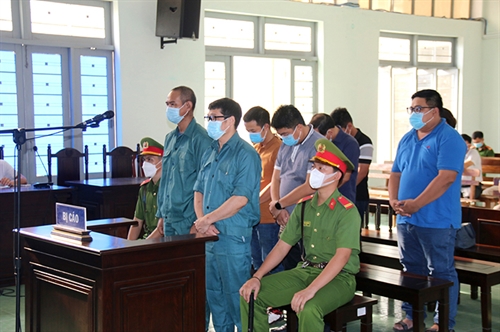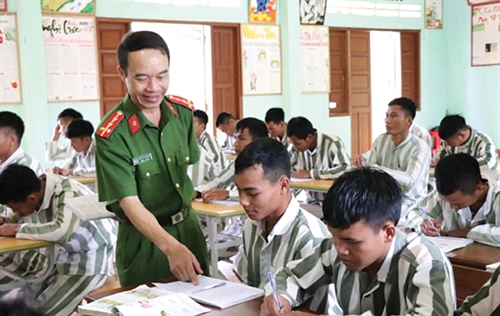Nguyen Cong Long, LL.D. Committee on Judiciary of the Vietnam National Assembly
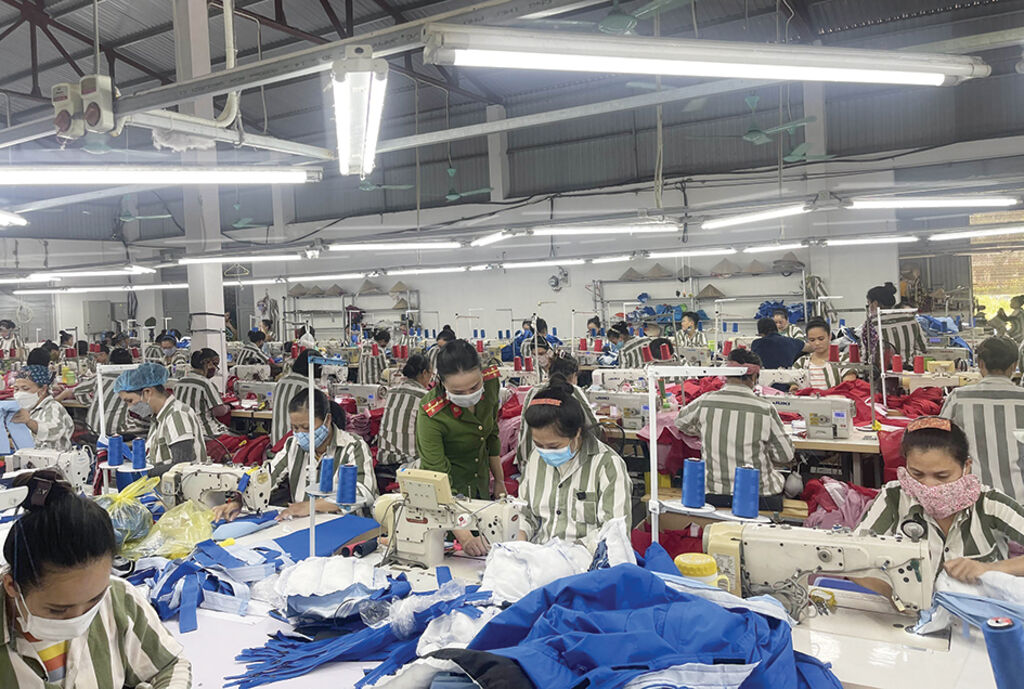 |
| Providing vocational training for prisoners at Ninh Khanh detention camp, Ninh Binh province__Photo: VNA |
According to the Ministry of Public Security’s statistics, every year, there are 50,000-55,000 inmates who have completely served their imprisonment sentences or are entitled to special amnesty. Since 2010, a total of around 650,000 prisoners have been released to return to their home localities. Due to their conviction history and limited academic qualifications and occupational skills, former convicts usually face discrimination and challenges when seeking community reintegration and employment and, therefore, badly need care and support from the State and the community.
Necessity of credit policies toward ex-convicts
One of the humane aspects of the Vietnamese State’s criminal policies is the assurance of conditions for community reintegration of former inmates with a view to preventing them from recidivism. The 2015 Penal Code (as revised in 2017) (the Penal Code) states: “Persons who have completely served their penalties shall be assisted to work and earn an honest living and integrate themselves into the community, and have their criminal records expunged when they fully satisfy the law-specified conditions.”[1].
The 2019 Law on Execution of Criminal Judgments and the 2018 Law on Special Amnesty both provide principles of ensuring the participation of agencies, organizations, individuals and families in criminal judgment execution and community reintegration facilitation activities. The State encourages agencies, organizations, units and individuals to help persons who have completely served their imprisonment sentences or are entitled to special amnesty or conditional early release reintegrate themselves into the community[2]. These principles are concretized in Government Decree 49/2020/ND-CP dated April 17, 2020, on community reintegration of former inmates (Decree 49). Accordingly, measures to facilitate community reintegration include: (i) provision of information, communication and education about community reintegration; (ii) provision of psychological and legal aid; (iii) facilitation of vocational training and job creation; and (iv) other measures, such as admission of ex-prisoners to agencies, organizations or production or business establishments; and application of tax incentives for those engaged in supervising, educating and assisting former inmates. One of the law-specified employment support measures is to provide former inmates with loans to receive vocational training which are similar to the policy on grant of loans for students from the National Employment Fund[3]. However, so far there is no specific guidance on credit policies for production or business establishments to employ former inmates.
The recent survey data show that by 2021, around 5,420 former inmates have been employed (accounting for 3.56 percent of the total of 152,328 inmates). However, the rate of vocationally trained ex-convicts remain too low (some 2.36 percent) and those provided with loans in localities even account for a smaller rate (0.93 percent)[4].
In reality, the ex-prisoners’ loan demand for learning jobs and earning livelihood remains enormous (accounting for 35.45 percent of the total). However, most of them can hardly satisfy all conditions for getting access to loans of commercial banks. Even though former inmates are eligible for loans to receive vocational training and find jobs under Decree 49, they are still bound to fully satisfy credit-related conditions, i.e., they must be members of poor households, households living just above the poverty line or households earning an average income, and may only borrow loans from the National Employment Fund while this Fund’s sources are insufficient for loan provision[5].
Some localities have set up their own funds to provide loans for former inmates’ job seeking but these funds remain small and unstable. Most of ex-offenders feel hard to get access to lawful and safe loans. Meanwhile, the policy on vocational training and provision of loans for job creation has proved not effective enough for mobilizing resources from organizations, individuals and enterprises to support former inmates as the majority of them usually refuse to employ or provide vocational training for former convicts[6]. This is the main reason for a high rate of recidivism among former inmates.
The above situation prompts to the need to enact a legal document on credit policies exclusively for former inmates as it would provide a mechanism for facilitating community reintegration of these persons and help ensure their equality with other disadvantaged persons, such as drug addicts and prostitutes having undergone rehabilitation and currently eligible for similar support policies.
Specific credit policies toward former inmates
Major credit policies for ex-convicts are provided in Prime Minister Decision 22/2023/QD-TTg (Decision 22) released on August 17, which will take effect on October 10, specifically as follows:
Credit policy beneficiaries
Eligible for credit policies under Decision 22 are not only former inmates but also production and business establishments employing these persons, particularly small- and medium-sized enterprises, cooperatives, cooperative groups and business households. They may borrow loans from the Vietnam Bank for Social Policies (VBSP) for organization of vocational training and development of their production and business operations, thereby creating more jobs for former inmates.
However, Decision 22 says that credit policies do not apply to persons entitled to conditional early release (who are also entitled to community reintegration support under Article 45 of the Law on Execution of Criminal Judgments). As explained by the decision-drafting agency, persons entitled to conditional early release are those having not yet completely served their imprisonment sentences and may be forced under court rulings to return to prisons for serving the remaining term of imprisonment in case they commit violations during the probation period. Therefore, only after offenders completely serve their probation period without relapsing into crime and obtain certificates of complete serving of imprisonment sentences, will they be eligible for credit policies.
Conditions for loan borrowing To get a loan, a person who has completely served his imprisonment sentence and acquires a certificate of complete serving of imprisonment sentence as defined in the Law on Execution of Criminal Judgments or a person who is entitled to special amnesty and granted a certificate of special amnesty as defined in the Law on Special Amnesty must satisfy the following conditions: (i) having the need for the loan; and (ii) being on a list of former inmates who return to reside in localities, have strictly abided by law and have not been involved in social evils, which is drawn up by the commune-level public security office and certified by the commune-level People’s Committee; and (iii) applying for a loan within five years from the date of complete serving of his imprisonment sentence[7].
A production or business establishment that wishes to take a loan must meet the following criteria: (i) having been lawfully established and operating in accordance with law; (ii) ensuring that at least 10 percent of its total employees are persons who have completely served their imprisonment sentences, and signing labor contracts with these persons in accordance with the labor law[8]; and (iii) having a loan-borrowing plan certified by the commune-level People’s Committee of the locality where such plan is to be implemented.
Both subjects mentioned above must be those owing no debts to the VBSP for loans previously provided to them under other credit programs for the same use purpose.
Loan borrowing methods
A former inmate may borrow loans by either of the following methods. First, he may take a loan through his household or representative of his household who will personally conduct transactions with the VBSP. In case the household has no member aged full 18 years or older or all other household members have no working capacity or full civil act capacity, the former inmate may personally conduct transactions with the VBSP to get the loan. This method is similar to that applicable to students. Second, the VBSP may entrust a socio-political organization to provide the loan to the ex-offender. This method is similar to that applicable to the poor and other policy beneficiaries[9].
As for production or business establishments, they may get loans directly from the VBSP’s local branches.
Maximum loan amount, loan term and interest rate
The maximum loan amount will be determined on the basis of loan use purposes and borrowers. Accordingly, a former inmate may get a loan of up to VND 4 million for his job learning[10]. A former prisoner wishing to develop his production or business activities or create jobs for others may get a loan of up to VND 100 million[11]. A production or business establishment may get a loan of up to VND 2 billion per project and a loan of up to VND 100 million per employee[12].
Meanwhile, the loan term will be determined according to loan use purposes. The term of loans for vocational training purpose is calculated from the date of former inmates’ receipt of a loan to the date of full payment of the loan principal and interest. For a vocational training course of up to one year, a loan must be fully repaid within a duration at most doubling the period from the date of loan receipt to the date of conclusion of the training course. For other training courses, the loan repayment duration must not exceed the period mentioned above.
Specific terms of loans for production or business development or job creation will be decided by the VBSP after reaching agreement with borrowers on the basis of lending sources, production or business cycle and repayment capacity of borrowers which, however, must not exceed 120 months[13].
Regarding loan interest rate, Article 9 of Decision 22 states that the sole interest rate for loans, regardless of their use purposes, is equal to that of loans for poor households, and that the overdue interest rate is equal to 130 percent of the lending interest rate[14].
Loan security and funding sources for loan provision
As provided in Decision 22, loan security is not required in case former inmates borrow loans for vocational training, production or business development or job creation. Meanwhile, production or business establishments employing released prisoners are required to provide security for every loan exceeding VND 100 million in accordance with law and the VBSP’s regulations[15]. Persons that borrow loans from the VBSP with each loan valued up to VND 100 million under credit programs are not required to take such security measures as pledge and mortgage of property but must take the measure of pledge of trust.
Sources for providing loans to former inmates come from local budgets (via the VBSP’s local branches under decisions of provincial-level People’s Committees). The VBSP may also mobilize funding sources for loan provision, and may have the interest rate difference and management expenses covered by the state budget provided that such difference is within the management expense limit assigned by the Prime Minister in each period and does not exert pressure on the state budget[16].
Recommendations for enforcement of credit policies toward former inmates
To realize credit policies and facilitate community reintegration for released prisoners, the author proposes some solutions.
Firstly, local public security offices should coordinate with related agencies and units in advising provincial- and district-level People’s Councils and People’s Committees on allocating local budget funds via the VBSP’s local branches to provide loans to former inmates. They also need to join hands with the VBSP in supervising the provision and recovery of loans. Particularly, commune-level public security offices must draw up and provide before the 5th every month lists of former inmates wishing and eligible to borrow loans to the VBSP. Meanwhile, the Ministry of Public Security should act as the in-charge agency and coordinate with related ministries, sectors and agencies and the VBSP in organizing the implementation of these policies; and propose addressing problems arising in the course of implementation.
Secondly, provincial- and district-level People’s Committees should annually consider allocating local budget funds via the VBSP to provide loans to former inmates. At the same time, related provincial- and district-level units should submit to competent authorities for approval the annual allocation of local budget funds via the VBSP for loan provision. For their part, commune-level People’s Committees should certify whether former inmates and production or business establishments fully satisfy the conditions for enjoyment of these credit policies.
Last but not least, the VBSP should provide guidance on dossiers for loan borrowing, procedures for loan provision, loan repayment term and extension thereof, and overdue debt rescheduling. Moreover, they are responsible for managing, mobilizing and using funding sources and provide loans for eligible subjects under regulations. They are also tasked to coordinate with related ministries and sectors in reporting arising problems to competent authorities for solution.-
[1] Article 3.1.g. of the Penal Code.
[2] Articles 4 and 45 of the Law on Execution of Criminal Judgments and Article 20 of the Law on Special Amnesty.
[3] Article 11.2 of Decree 49/2020/ND-CP.
[4] According to the Ministry of Public Security’s Report 382/TTr-BCA dated July 10, 2023, more than 83 percent of total former inmates with their criminal records not yet expunged have been employed, mainly in cultivation, livestock production and other simple jobs. Very few of them have been able to work as technical workers.
[5] This Fund has received no additional allocations from the state budget since 2016. It is explained that under Article 8.11 of the 2015 Law on the State Budget, state budget funds will not be allocated for off-budget state financial funds.
[6] Most former inmates are unsustainably employed so they can hardly stabilize their livelihood. According to the Ministry of Public Security’s report released in July, almost 83 percent of former inmates earn a monthly income of under VND 7 million, of whom more than one-third earn less than VND 4 million per month.
[7] Article 3 of Decision 22. The five-year time limit specified in this Article aims to ensure consistency with the program on provision of loans for households that have just escaped from poverty and are entitled to borrow loans from the VBSP, and to limit borrowers, thereby ensuring feasibility of the program.
[8] This provision stems from the reality that former prisoners account for 5-10 percent of total employees of production and business establishments (according to the Ministry of Public Security’s 2021 survey).
[9] As specified in Decree 78/2002/ND-CP dated October 4, 2002, on credit for the poor and other policy beneficiaries.
[10] This level is also applicable to students as specified in Decree 157/2007/ND-CP dated September 27, 2007, on credit policies for students, and Decree 05/2022/ND-CP dated March 23, 2022, amending a number of articles of Decree 157.
[11] This level is also applicable to poor households, households living just above the poverty line or households having just escaped from poverty, and employees for development of production or business activities or creation of jobs as specified in Decree 78/2002/ND-CP, Decision 15/2013/QD-TTg, Decision 28/2015/QD-TTg (as revised under Decision 02/2021/QD-TTg), and Decree 61/2015/ND-CP (as revised under Decree 74/2019/ND-CP).
[12] This level is also applicable to programs on provision of loans for creation of jobs, provision of support for sending persons abroad as guest workers and for creation of jobs for the youth as specified in Decree 61/2015/ND-CP.
[13] Article 8 of Decision 22.
[14] This interest rate is also applicable to HIV-infected persons and their households, drug addicts and prostitutes having undergone rehabilitation as specified in Prime Minister Decision 29/2014/QD-TTg dated April 26, 2014.
[15] Article 292 of the 2015 Civil Code specifies nine measures to secure obligation performance, including pledge of trust.
[16] Article 11 of Decision 22.

